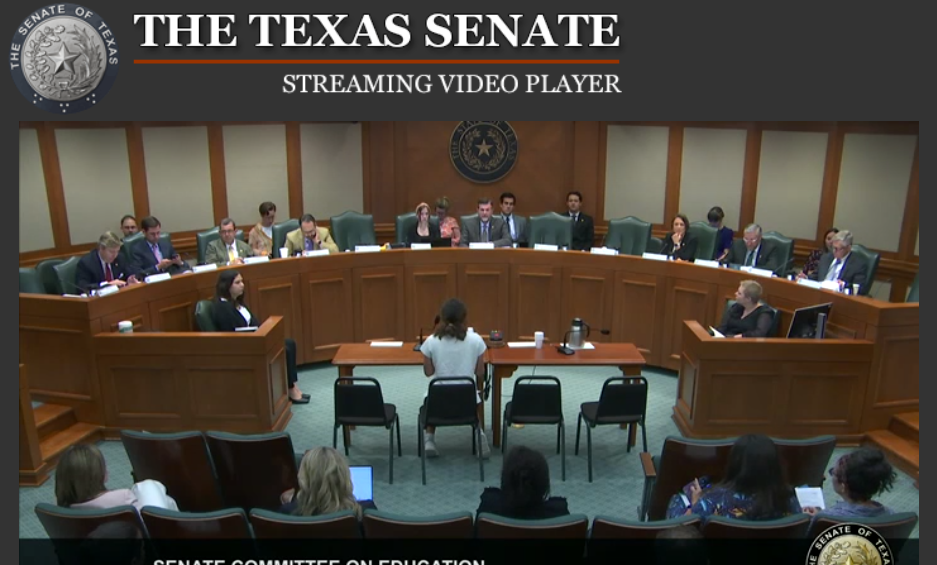Students Analyze Legislative Testimony in Banned Books Week Lesson
Texas school librarian Minda Anderson created a lesson for AP English students to analyze rhetoric and learn about banned books and censorship.

Each year during Banned Books Week, Texas teacher-librarian Minda Anderson speaks to her students about book banning and title selection in collection development. But last September, after discussions with 11th-grade teacher Anni Knox, Anderson let one of the students’ peers do the talking and created a lesson for an AP class at the same time.
While planning for the annual event at Ann Richards School for Young Women Leaders in Austin, Knox suggested doing a rhetorical analysis of speeches on book banning.
“I feel really passionate about this topic and wanted to get creative with the teacher and make it a useful visit to the library,” Anderson says.
It was not only a new angle into book banning, but would bring older students into the library, which can be a struggle because their curriculum is so extensive—especially at the AP level, according to Anderson.
She created a lesson that had the 11th-grade English AP students view and analyze 2022 legislative testimony for and against Texas HB 900, also known as the READER Act. The bill would have required booksellers to rate the sexual content of materials they sell to
schools.
|
Minda Anderson’s Tips for Creating a Similar Lesson
|
Some students were familiar with the issues of book bans because of the school’s Banned Books Club, but the testimony “really drove home the direct impact of these bills for our students,” she says.
One of those testifying was then–eighth-grade student Lily Rerecich, who is now an 11th grader at Anderson’s school.
“It was a really cool experience because the kids were seeing someone they know testify at a Senate committee hearing,” says Anderson.
Students watched testimony from both Rerecich, who opposed HB 900, and Laura Pressley of Citizens Defending Freedom, who supported it. The students took notes on the rhetorical strategies each person used, then had the option to write a timed essay analyzing those strategies as practice for the AP exam or just join the class discussion. During the class conversation and in their essays, students analyzed the logic and emotion each speaker used.
One student wrote: “Throughout the testimony Rerecich shows wisdom beyond her years, expertly appealing directly to the committee’s emotions using her status as a public school student, and employing expansive and concise diction to support her position that the bill would be harmful. In contrast, in favor of passing the bill, Dr. Presley utilizes ‘I’ statements and repetition to attempt to persuade the committee of her point, that the bill will support the protection of children.”
Another wrote: “Rerecich relies on serious diction to show that this bill is a serious problem that will affect her and other students in Texas, preventing them from [accessing] books based on others’ opinions. Rerecich uses words like ‘feasibly’ and ‘prevented’ in paragraph 2 to state her point that vendors cannot match the demand to rate every book in their category in time….
“In paragraph 2, Presley uses supportive diction like ‘amazed,’ ‘congratulate,’ and ‘protect’ to talk about her support for the bill and how it will protect the children.”
Having the students analyze the testimony from each side of the issue allowed Anderson to show both sides in discussing whether someone should be able to file a complaint about a book they disagree with.
“That helped me feel a little more comfortable in discussing this,” says Anderson.
Anderson repeated the lesson this past September, this time with Rerecich in the class watching her testimony.
“The discussion hit home more for the students this year, because we are under Texas SB13, which has a lot of oversight and extra hoops for purchasing new books for school libraries,” says Anderson.
RELATED
The job outlook in 2030: Librarians will be in demand
The job outlook in 2030: Librarians will be in demand
ALREADY A SUBSCRIBER? LOG IN
We are currently offering this content for free. Sign up now to activate your personal profile, where you can save articles for future viewing






Add Comment :-
Be the first reader to comment.
Comment Policy:
Comment should not be empty !!!